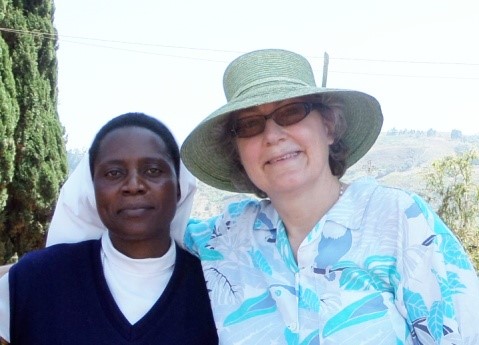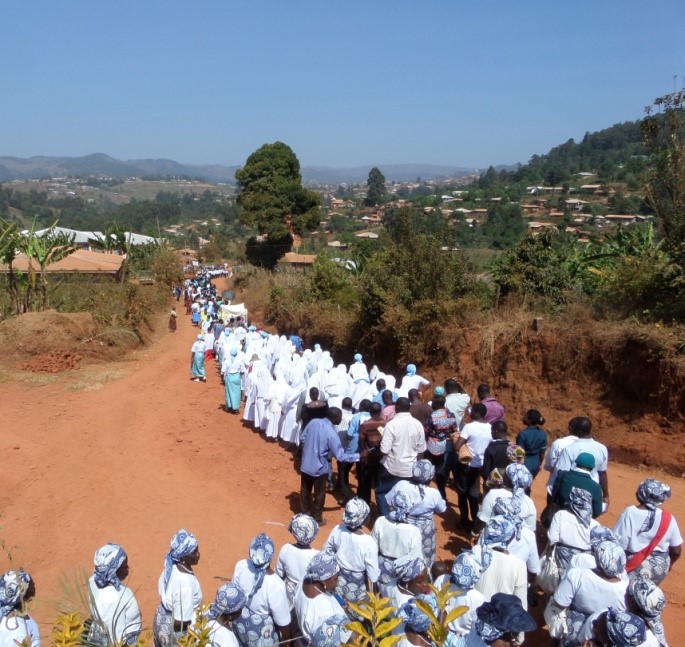Joyfully Live in Fellowship with Creation

Last month Julie Cox from St John Fisher Parish, Rochester, travelled to Cameroon to visit Sr Annette, who shares her deep conviction to live simply, sustainably and in solidarity with the poor. Here she shares her experience of “ecological conversion”.
In 2011, when the livesimply Parish Award Scheme was launched by CAFOD, I heard Fr. Sean McDonagh SSC speak passionately about the integrity of Creation and the impacts of climate change. A seed was sown and I continued to attend subsequent livesimply meetings, learning more about the connection between our Christian faith and human-ecology.
During a Creation-focused meeting at the Franciscan Study Centre, Canterbury, I had the good fortune to meet a Franciscan Sister from Cameroon, Sr Annette Tangwa TSSF. We became close friends, sharing a passion to restore Creation.
Find out more about becoming a liveSimply parish
I had the great privilege of reconnecting with my dear friend Sr Annette last November when I travelled to Cameroon. What struck me when I first arrived in this central African country was the warmth, openness and receptivity of the Cameroonian people. It was a truly wonderful experience to be among a rural community centred on the parish of the Sacred Heart, Shisong.
The main purpose of my visit was to establish a link between the pupils of St Francis Secondary School (where Sr Annette is assistant head teacher) and a local environmental charity to encourage community involvement in Pope Francis’ vision and teaching on the environment.
This vision is inspired by the Franciscan approach to caring for Creation and, in particular, by Pope Francis’ prayers and teaching in his encyclical Laudato Si – On Care for Our Common Home. It’s about communities coming together and learning how to restore and protect natural resources for long-term sustainability of our earth.
Download CAFOD’s guide to the encyclical
It may be described as an ecological conversion involving linking, loving, learning and living – reaching out to our sisters and brothers and working together for the common good; connecting with Creation, recognising how everything is inter-connected and becoming aware of how we impact the planet as individuals and communities; seeing and loving our Creator God in and beyond Creation, to learn from nature (God’s design) and how best to manage the earth’s resources to live simpler, authentic lives in unity and peace.
Since this community live rural lives, this vision may be applied in very practical ways, through conservation education: soil, land and forest restoration; and through water-catchment protection and bee farming and many other community-initiatives.
As a first step, the school-staff were introduced to a conservation education resource pack, including teachers’ guidance notes, an illustrated book, case-study films and practical conservation action sheets and classroom poster.
The community in Shisong are promoting justice, peace and integrity of Creation. Their experiences can be shared with the wider world thus enabling more people to praise God in unison with other creatures, especially through music and dance, making up such an important part of the rich cultural heritage of Africa.

Pope Francis asks in paragraph 160 of Laudato Si’, “What kind of a world do we want to leave for those who come after us?” My response is: “A world which is beautiful and well cared for, a world where degraded landscapes have been or are being ecologically and lovingly restored.”
Here in the UK, a first step to ‘ecological conversion’ might be to open our eyes more fully to see the astounding beauty and immense value in Creation. If you are in a city, look up at the sky and watch the clouds or go for a walk in your nearest park and listen to bird song. Slowing down and taking quiet countryside walks can help enormously. Our busy lives will benefit from this, since whenever we connect and care for Creation, Creation cares for us.
Wonderful suggestions for reflection, discussion, action and prayer are listed in part 4 of CAFOD’s encyclical study guide and I would like to emphasise how quickly we could restore the earth back to fullness if everyone would only accept the calling to a deep conversion, to see how Christ is present throughout Creation. This will indeed transform us and our communities and move us to treat the earth and each other with tenderness and love. So let us sing a new song and join hands in fellowship with Creation, praising God!